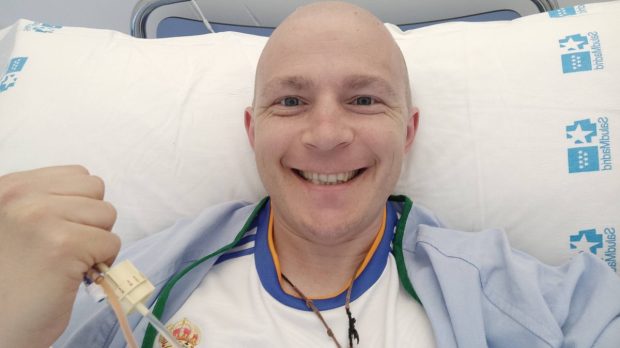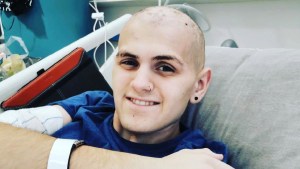Javier Díaz Vega is a 35-year-old psychologist, husband, father, and messenger of hope.
We contacted him through Twitter, where he’s making an impact. We wanted a face-to-face chat because his eyes and his smile transmit a lot, but he’s weak from chemotherapy and isn’t up to receiving visitors. Even so, he made time to answer our questions. He opened his heart. He is clear about his mission:
I believe that what makes living through pain better is when we discover and embrace its meaning (or give meaning to it, of course). It involves many difficult moments and I believe that it’s God’s grace that sustains us, but suffering is the necessary condition for this testimony. What helps me to live through this pain is to discover that through my own experience other people can find hope, ask themselves questions, pray …
His mother’s suicide
When Javier was 22 years old, his mother died by suicide. She had been suffering from depression for a long time. For him it was an earthquake in his life — a very difficult experience that left him with a feeling of guilt that was difficult to bear. It was like a shadow, an emotional threat … until he learned to forgive.
He says that learning to forgive granted him liberation and helped him to be at peace with himself, with his mother, and with God.
He tells this story in a book he published in Spanish, “Between the Bridge and the River” (“Entre el Puente y el Río. Una mirada de misericordia ante el suicidio”). He decided to write it to break taboos surrounding this topic and to help thousands of people going through a similar situation. He also did it to send a message about the need to take political measures for prevention.
As I recount in my book, practically from the first day they helped me to know what the Church expressly says about suicide, thank God. And this is something that undoubtedly helped me to live through that pain and fight against the feeling of guilt. My mother’s case, with a depression that was clearly perturbing her will, made us pray hard for her soul, discovering that only God truly knows my mother’s heart, and recognizing that his mercy is eternal and able to find a way to embrace her.
Cancer
Javier’s son had just turned 8 months old and he was enjoying fatherhood immensely when he got some very bad news: a diagnosis of lymphoma.
It was a bucket of cold water, since it was my second cancer in less than a year and it came with a broken arm, an operation, and a rehabilitation process. These were moments when all human security fails and plans disappear, leaving only each day as it comes and trust in God and in the doctors. Thanks to that and after almost 7 months, my arm is almost recovered and the chemotherapy treatment is completed. The results half-way through the treatment were very good and now we’re waiting to confirm them with new tests.
For the moment, Javier is experiencing an unpleasant non-medical side effect: he cannot hold his son in his arms. Being away from him, in the hospital, experiencing uncertainty … He relies on his loved ones, on the people around him, and on his Twitter community. He’s totally honest; he tells them about his suffering, that there are good days when he has the strength to face whatever comes and other much more complicated days.
His Twitter community
“For me it has turned out to be a precious ‘cushion’ where I can feel accompanied in the good and bad things I experience,” says Javier about his followers. He knows about Twitter’s defects, about the dangers of that space where many people hide behind anonymity. He understands that some people are very negative, but he has found that it’s a platform where he can talk about things naturally as he lives them—and that his message is needed. What he receives in return enriches him.
Feeling united in prayer with so many people who keep you in mind in so many places, who remember you and your family wherever they pray, whether it’s at their home, their parish, or even the Holy Land or Marian shrines around the world, makes you thank God a lot and obviously pray for them too, even if it’s like in these past months: in a hospital room. If I’m someone who brings them closer to God in one way or another, then great.
The grace of recognizing God in suffering
Impressed by his answers and by his naturalness in talking about such difficult episodes in his life, we asked him how he is able to recognize God in pain. His answer, like his tweets, hit the bullseye:
In the cross. Perhaps in everyday life we “get used to it,” seeing it in every church, wearing it around our neck. But what about when it’s time to embrace a cross such as pain? There it’s not so easy; there’s resistance, rejection of that “scandal and foolishness” that St. Paul talks about. But he also says that it’s our glory, and that means that our pain makes us like Christ, identifies us with him. It’s a grace to recognize God in pain, because sometimes what pain pushes you to do is to look only at yourself, but when you discover (by that grace) that God himself is suffering with you, then you can embrace that cross. Even if at other times it seems to defeat you, you can get up because Christ is carrying it with you. As I was saying, it is a grace we must ask for constantly in prayer and in a constant sacramental life.
Hope
He’s always accompanied by hope, which he sees in the Virgin Mary and finds every day when he prays the Rosary. “Living in hope means a way of going through life accepting the small and great sources of help that you have, which also give you reasons for not lowering your guard, for maintaining joy and not letting yourself be dragged down.”
The false message of success
Society, advertising, television, and social networks end up selling us how important it is to be successful in life, to feel good and happy, to have ‘good feelings.’ But reality always prevails. That’s why Javier’s message goes so deep: it refutes that idea and presents life as it is. Suffering always appears in life. What we can change is the way we face it.
For Javier, the world’s message is dangerous.
In the end when failure or suffering comes, we don’t know how to manage it; we run away from it. We see this more and more in many young people who don’t look at their own lives with hope, in people who only see difficulties or who get caught up in the search for wellbeing and happiness, even if it ends up being only a mask. I’m especially concerned to see this “rosiness” in the church; we cannot turn Jesus into a kind of coach or put aside the cross. We must speak of the cross and of the risen Christ who gives meaning to our joy and also to our suffering.
Javier politely bids us farewell with the same naturalness with which he began to converse with us. He spoke to us about his life, his story, with such authenticity that we felt like he was our friend after just a short chat. The same as his followers on Twitter experience. We’re already part of his community.



